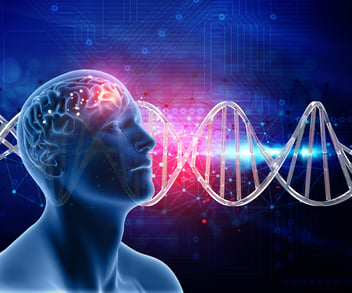DNA: I Am Who I Am… or Am I? – Session Two
- Home
- Blog

Tinker with Your Genes to Determine Your Destiny.
“In the past, geneticists have looked at so-called disease genes, but a lot of people have changes in their genes and don’t get these diseases. There have to be other parts of physiology and genetics that compensate.”
– Craig Venter
“DNA + Environment + Triggers + Chance = the Structure and Function of All of the Cells in Your Body. To Determine Your Destiny, intelligently alter your ‘environment’ through Epigenetics.”
– Bruce Alan Kehr, M.D.
Let’s focus on the role of DNA on your health and well-being. When it comes to your physical condition, and the genes you inherited from your parents, do you believe in free will, or that your future is already determined by their DNA inside you? The answer is, BOTH. Picture this: You’re in a new doctor’s office, sitting across from the nurse practitioner in your gauzy white gown, anxiously awaiting the encounter with the doc. After the pleasantries about the weather and the lunch-hour traffic, what’s the first item of business? If you’re like the majority of patients, it probably includes the words “Medical History”. The questions covered are often so predictable you don’t give them a second thought. “Do you have diabetes in your family? A history of glaucoma? Cancer?” “How many times a week do you drink? Do you smoke? How many partners have you had?” Without much thought required, you probably have a number of automatic replies for the doctor. And yet I invite you to take a closer look at these routine questions, because hidden within them is a confounding contradiction that belies a crucial fact about our bodies: In one category, you’re asked to name the things you can’t change—a history of familial disease or complications. These have already been “Determined.” But the other category—smoking, drinking, sex, exercise, and the like? These relate to your “Free Will.” These are entirely within your power to control—and change. While you may have been born and bred to believe that DNA is Your Destiny, the reality is you can now discover the keys to your own genetic code—and unlock that code to determine your own destiny… and to improve your health, well-being, and “Healthspan.”
My greatest joy is to help you in your journey to become the best person you can be—whatever that may mean to you. The honor and privilege that comes with that mission requires me to go beyond simplistic pop psychology, and take you straight into the mind, heart, and brain of the psychiatrist’s consulting room, right alongside me. I try to present you the latest concepts that can change your worldview, and give you hope, inspiration, and tools that you can use to determine your future. That said, in this second week of our DNA series, I want to take a deep-dive with you into a key vocabulary word that may change your mind once and for all that your fate is baked into the genetic code you inherited from birth. The word is Epigenetics. Let’s dig in.
Epigenetics means “over or above genetics,” and refers to how both the external environment and internal physiologic environment can interact with the DNA within the nucleus of each cell in the body, to alter how these cells function. So why does your nurse practitioner ask you those questions about smoking or your eating habits? Because, quite simply, our environment and habits have the power to transform how our genes express themselves—how they govern the structure and function of each and every cell in our body. This transformation is called an epigenetic change, and it occurs because within every gene is a biological switch that can be turned on or off based on the type of environment we find ourselves in, or triggers we choose to invoke. In other words, our genes are not stagnant, they dynamically interact with their environment, and our personalities and bodies can evolve quite a bit differently depending on which genes are switched on or off. If we have a gene that makes us vulnerable to addiction, it can lay dormant for years, until we feed it certain stimuli—tobacco, alcohol, opioids, and the like—and those triggers, like a switch, turn the gene on and suddenly we are addicted. Similarly, we may have a gene or set of genes that are particularly sensitive to certain hormones given off by our endocrine (hormone-producing) system. We may never experience the effects of those genes unless we find ourselves in an environment where our hormone levels are too high or too low—but once our genes are flooded with that hormone, our minds and bodies shift how they function, and fast. Stress and trauma are also examples of environmental influences and triggers that can take a toll on our gene expression. Other genes can be triggered by our diet to unmask underlying mood disorders.
Those switches can wreak havoc in our lives. They can dictate everything from drug or alcohol addiction to whether or not we develop a mental illness like major depression or an anxiety disorder. And thus, those switches should be carefully managed. Many psychiatrists do not choose to focus on the epigenetic aspects of our mental health—and as one of those who do, I am surprised that this kind of information is not put into practice more often. If we can be proactive about our genetic proclivities, we can save ourselves from months or even years of emotional pain and suffering.
Epigenetics proves that we DO control our destiny through epigenetically modifying the expression of our DNA. In Part Three of this series, coming up next week, we’ll explore how we can modify gene expression even further—and then we will provide you a “One Gene/One Blog” series, where, for each gene, we will educate you about how to have power over the genes you were born with, and how to alter how they affect your future.
DNA: I Am Who I Am… or Am I? Blog Series
- Does DNA Determine My Destiny?
- Tinker with Your Genes to Determine Your Destiny
- A Simple Cheek Swab Brings Good Karma
- Test Your DNA to Determine Your Reality
- The BDNF Gene: Use “Fertilizer” to Grow a Majestic ”Rainforest Brain”… and Introducing “GENiE” and “DNA 4 KIDS”
- The MTHFR Gene: “Manufacture” Your Way to Health and Happiness Featuring “DNA 4 KIDS” with “GENiE”
- The SLC6A4 Gene (Serotonin Reuptake Gene): Improve Your Mood and Anxiety through a Simple Cheek Swab Featuring “DNA 4 KIDS” with “GENiE”
- Tame that Emotional Roller Coaster Ride Genetic Testing for the ANK3 Gene and CACNA1C Gene Featuring “DNA 4 KIDS” with “GENiE”
- Is Addiction Inherited? Genetic Testing for the OPRM1 Gene, Opioid Abuse, and Alcoholism Featuring “DNA 4 TEENS” With “GENiE”
- Surf’s Up: Use Your Genetic Code to Ride the Stress Wave with Ease The COMT Gene Featuring “DNA 4 KIDS” With “GENiE”
- Mental Illness is not a Myth—and Human Genomics Proves It The DRD2 Gene and Dopamine Featuring “DNA 4 KIDS” With “GENiE”
- ADHD in the Age of Distraction The Tricky Genetics behind ADHD and ADRA2A Featuring “DNA 4 KIDS” With “GENiE”
- Overweight and Obesity – Is it Me, or My DNA? 5HT2C and MC4R: Can Your Genes Make You Fat?
- Is Alcoholism Inherited? Can a Tiny Gene Help Treat It? The GRIK1 Gene
- 2018 Women’s Health and Wellness Summit DNA Keynote Address
Related Information
- Learn about Genetic Testing
- Learn about Potomac Psychiatry
- Meet Our Doctors
- Contact Potomac Psychiatry
.png?width=144&height=144&name=Untitled%20design%20(34).png)



